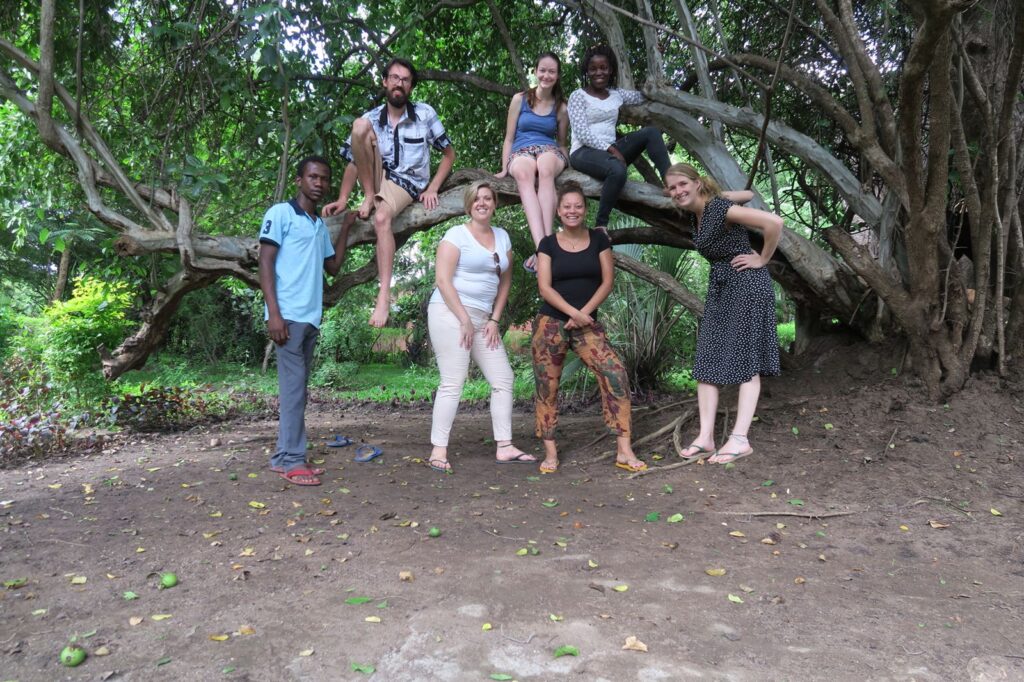By Geertje Lavrijssen, Coordinator of the Sustainable Tourism Challenge
Getting started week 1 & 2: I thought it is time to give you all an update on how the Sustainable Tourism Challenge has been going so far! Time is flying by and we are already halfway down the Challenge programme in Zambia.
Arrival
I , as being the coordinator, arrived at the end of February to arrange everything that we needed to get started in Mfuwe, accommodation (we found a great place at Just Africa), transport (we found Joseph our taxi guy), basic needs for living and getting back in contact with my network in Mfuwe. Things have been busy these first weeks since there was lots to organise and in temperatures of 30 degrees and up, you do need to slow down a bit as well!
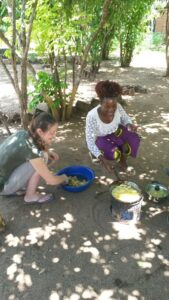 The STC Team arrived the first weekend of March at Lusaka Airport. I picked them at the airport together with Oscar (our local partner and friend) since Lusaka is only a 800km drive from Mfuwe we did need to make it a weekend trip ?. We went with a big and comfy car to make the long roadtrip first to Lusaka and a day later together with the STC team back down to the South Luangwa National Park (SLNP) and Mfuwe, our research area for the next 12 weeks!
The STC Team arrived the first weekend of March at Lusaka Airport. I picked them at the airport together with Oscar (our local partner and friend) since Lusaka is only a 800km drive from Mfuwe we did need to make it a weekend trip ?. We went with a big and comfy car to make the long roadtrip first to Lusaka and a day later together with the STC team back down to the South Luangwa National Park (SLNP) and Mfuwe, our research area for the next 12 weeks!
Settling in
The first week was needed to acclimatize and orientate, getting to know the area and each other. From this week on we’ll be living and working together for 24/7 for 3 months. That does need some flexibility and adjustment, as well as getting used to the new weather conditions, the different kind of food and new surroundings. This first week we went to explore Mfuwe Town, checked out the main gate of the SLNP, went on safari, ate Nshima with our hands and the team got to know new local people and visited the lodges and some surrounding communities. We were getting settled in!
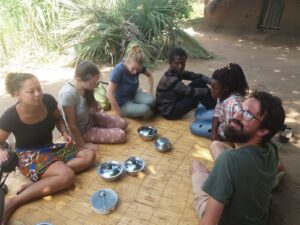 Our second week was when we really got started! The week started with a Teambuilding session, since there are 2 local young professionals from Mfuwe area that also joined our team. It was important to get to know each other and share knowledge to become a Great Team. Next to this we started on local language classes, Nyenja, to enable us to greet and introduce ourselves in a good manner to the local communities. It was a busy week, next to actively starting on the teambuilding and setting our norms and values as a team for working together, we also worked on getting to know more about the Zambian culture, intercultural communication skills and started on formulating our interview questions for the research. As I said it was a busy week with lots of new information to process and adjust to.
Our second week was when we really got started! The week started with a Teambuilding session, since there are 2 local young professionals from Mfuwe area that also joined our team. It was important to get to know each other and share knowledge to become a Great Team. Next to this we started on local language classes, Nyenja, to enable us to greet and introduce ourselves in a good manner to the local communities. It was a busy week, next to actively starting on the teambuilding and setting our norms and values as a team for working together, we also worked on getting to know more about the Zambian culture, intercultural communication skills and started on formulating our interview questions for the research. As I said it was a busy week with lots of new information to process and adjust to.
Exploring the area: what will be the scope of our action research?
Also we started on really getting to know our research area better, going more in-depth with visiting local villages and communities around the area where we are living, transect walks. As a team we had decisions to make, since the area of Mfuwe that is influenced by the growing Tourism is covering a large distance. Most tourists travel between Mfuwe airport and the lodges that are situated at the riverside and are close to the main gate of the SLNP; this is a tarred road with a distance of 20km. Since we can’t cover this whole area with our team and the action research in the time we are here, we needed to make some important choices on where to start and focus on for the beginning of ou action research and project.
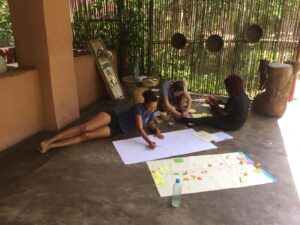
We made a big map of the area and investigated and discussed the options we had. There was one village, Maulide, where we were welcomed very friendly. It’s a slightly bigger village and a bit further away from the main tourism activity part of Mfuwe area. But it is still interesting to find out what this means for them, they live and work in Mfuwe area (Mambwe district) they see the visitors passing, they know there is tourism but do they benefit? Yes or no and in what way? So we decided to focus on this village as a starting point and if the time will let us see how we can take our research further to some of the other villages.
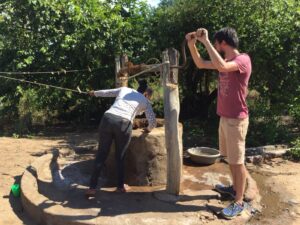 Since distances are long, road conditions not the greatest, transport options (walking or driving), weather conditions (rains, floodings, mud and hotness) everything can be quite challenging and time-consuming. Definitely a lot more than what we are used to in the Netherlands, but that’s part of the adventure. It does use up a lot of energy and we need early nights here in the African Bush to keep healthy!
Since distances are long, road conditions not the greatest, transport options (walking or driving), weather conditions (rains, floodings, mud and hotness) everything can be quite challenging and time-consuming. Definitely a lot more than what we are used to in the Netherlands, but that’s part of the adventure. It does use up a lot of energy and we need early nights here in the African Bush to keep healthy!
Asking the chief permission for this action research
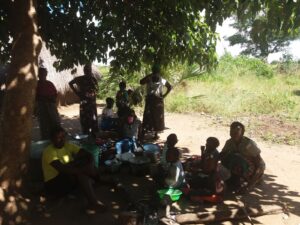 So as a team we decided to get started with our action research in Maulide village, we asked permission to the village headman and planned a courtesy visit to the Chief of the Area to inform him on our plans of conducting this research in his area and ask for approval. Chiefs are the traditional local leaders, there are different areas in the district all run by a local chief. They are from the old days the leaders of that area and are followed up on by bloodline. Every village will have a headman (the leader of the village) as well, that will be a person (mostly the oldest) of the family that started the village, the first person that asked the chief for the land and a location. Locals can ask the village headman (like a major) if they can join to live on that land and be part of the village, they will be given a yard and can be part of the village like that. So week 1 and 2 where full packed and very interesting!
So as a team we decided to get started with our action research in Maulide village, we asked permission to the village headman and planned a courtesy visit to the Chief of the Area to inform him on our plans of conducting this research in his area and ask for approval. Chiefs are the traditional local leaders, there are different areas in the district all run by a local chief. They are from the old days the leaders of that area and are followed up on by bloodline. Every village will have a headman (the leader of the village) as well, that will be a person (mostly the oldest) of the family that started the village, the first person that asked the chief for the land and a location. Locals can ask the village headman (like a major) if they can join to live on that land and be part of the village, they will be given a yard and can be part of the village like that. So week 1 and 2 where full packed and very interesting!

